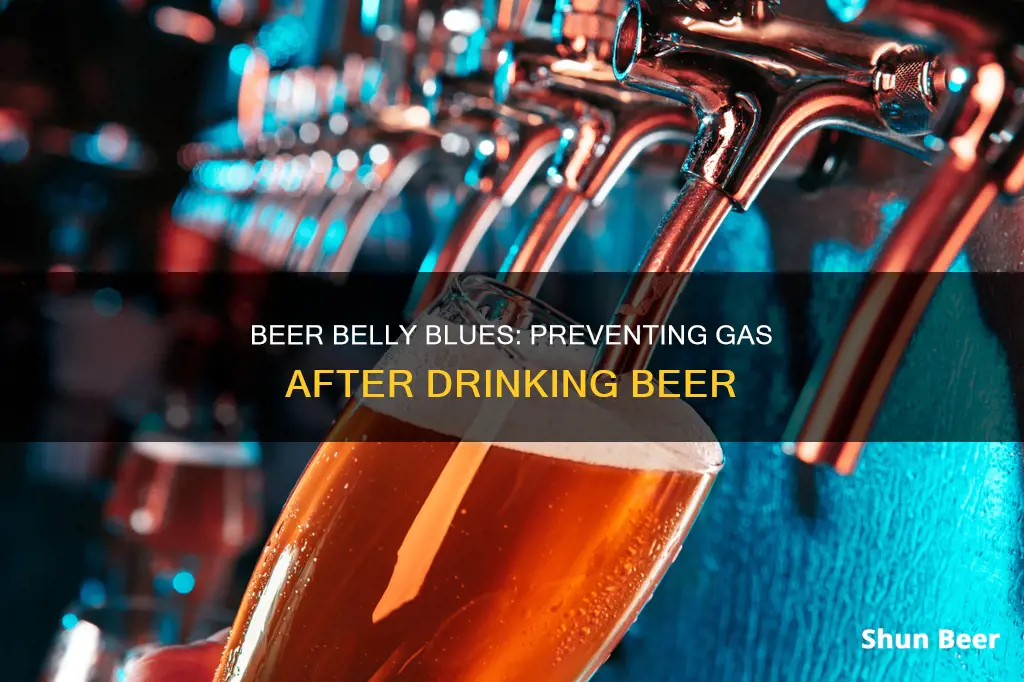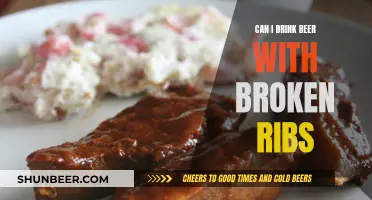
Beer is a beloved beverage for many, but it can also be a recipe for discomfort due to the gas it produces. The carbonation and fermentation processes in beer are the main culprits behind this issue, leading to bloating, burping, and flatulence. However, there are several strategies to prevent excessive gas and enjoy your beer without the unpleasant side effects. Firstly, opt for beers with lower carbonation, such as lagers, wheat beers, or light ales. Darker beers tend to have less carbonation, resulting in fewer gas bubbles in your stomach. Additionally, sipping your beer slowly and avoiding gulping or chugging can make a significant difference. This allows your body to process the beer better and reduces the likelihood of swallowing excess air, which can worsen the problem. Moderation is also key – limiting the number of beers you consume in one sitting gives your digestive system a break and helps prevent overwhelming gas production.
| Characteristics | Values |
|---|---|
| Beer type | Opt for beers with lower carbonation levels, such as lagers, wheat beers, or light ales. Dark beers have less carbonation. |
| Drinking speed | Sip slowly to allow your body to process the beer better. Avoid gulping or chugging as this can increase the intake of air. |
| Consumption amount | Limit the number of beers you consume in one sitting to avoid overwhelming your digestive system. |
| Glassware | Pour beer into a glass gently, aiming for a smooth pour that minimises agitation and excess foam creation. |
| Straws or chugging devices | Avoid using straws or similar instruments as these can introduce excess air into your system. |
| Gluten sensitivity | If you suspect gluten sensitivity, opt for gluten-free beers or those with low gluten content. |
| Hydration | Drink plenty of water alongside beer to dilute its effects and support proper digestion. |
| Carbonated mixers | Avoid mixers that contain carbonation as they can contribute to increased gas production. |
| Carbonated beverages | Limit or avoid other carbonated drinks when drinking beer. |
| Fatty foods | Consume lighter, well-balanced meals when drinking beer to avoid slowing down digestion and increasing gas production. |
| Probiotics | Incorporate probiotic-rich foods like yogurt or fermented products to promote a healthy gut microbiome and aid digestion. |
| Physical activity | Engage in light physical activity after drinking beer to stimulate digestion and promote the release of excess gas. |
| Antacids | Take an antacid or anti-gas medication prior to drinking beer to combat gas formation. |
What You'll Learn

Choose low-carbonation beers
Beer is a carbonated beverage, and the carbonation is a significant contributor to gas and bloating. Carbonation comes from dissolved carbon dioxide, which creates the fizz and bubbles in beer. When you drink beer, the gas gets released inside your stomach, and this can leave you feeling bloated and gassy.
To prevent this, you can opt for beers with lower carbonation levels. Here are some tips to help you choose low-carbonation beers:
- Go for lagers, wheat beers, or light ales, which have lower carbonation levels than highly carbonated beers like IPAs or stouts.
- Dark beers, such as those with rich brown or red tones, tend to have less carbonation. These beers can also make you feel fuller, so you're likely to drink them more slowly, giving your body more time to process the beer.
- When pouring your beer, aim for a smooth pour to minimise agitation and excess foam creation. Excess foam can contribute to increased gas formation in your stomach.
- Avoid using straws or chugging devices when drinking beer, as these can introduce excess air into your system, further promoting gas production.
- If you suspect gluten sensitivity, opt for gluten-free beers or those with low gluten content. Gluten can cause digestive discomfort, including gas.
Is It Safe to Drink Beer That's Two Days Old?
You may want to see also

Sip slowly
Sipping beer slowly is one of the most effective ways to prevent gas after drinking. Here's why this works and how to do it:
The increased intake of air from gulping or chugging beer exacerbates the gas-inducing effects of carbonation and fermentation. By drinking beer slowly, you reduce the amount of air you swallow, giving your body more time to process the beer and minimising the likelihood of excessive gas.
How to Sip Slowly:
- Be mindful of your drinking pace. Avoid gulping or chugging the beer.
- Choose lower carbonation beers, such as lagers, wheat beers, or light ales, which naturally induce less gas.
- Pour your beer into a glass gently, aiming for a smooth pour with minimal agitation and foam creation.
- Avoid using straws or chugging devices, as these introduce excess air, further promoting gas production.
- Stay hydrated by drinking water alongside your beer. This supports proper digestion and helps minimise gas formation.
- Opt for lighter, well-balanced meals to avoid slowing digestion and increasing gas production.
Remember, while sipping slowly is a great start, combining it with other strategies such as choosing low-carbonation beers, using appropriate glassware, and staying hydrated will further enhance your efforts to prevent gas after drinking beer.
Liquid Diets and Beer: Is It Allowed?
You may want to see also

Limit consumption
One of the best ways to prevent gas after drinking beer is to limit your consumption. Beer can cause gas due to its carbonation and high carbohydrate content. The fermentation process in beer can also produce gas in the digestive system, leading to feelings of fullness and discomfort. Therefore, it is important to restrict the number of beers you consume in one sitting to avoid overwhelming your digestive system and reducing the likelihood of excessive gas.
When drinking beer, it is recommended to sip slowly rather than gulping or chugging. Drinking beer more slowly allows your body to process it better and can reduce the amount of gas produced. Additionally, drinking water between each beer can help to flush out the carbonation and keep you hydrated, which can also reduce the likelihood of gas.
It is also important to pay attention to the type of beer you are consuming. Opting for beers with lower carbonation levels, such as lagers, wheat beers, or light ales, can help to minimize gas formation. On the other hand, highly carbonated beers like IPAs or stouts may lead to more gas.
If you find yourself frequently experiencing gas after drinking beer, it may be a good idea to cut back on your overall beer consumption. This can help give your digestive system a break and reduce the likelihood of gas buildup. Moderation is key when it comes to preventing gas after drinking beer.
In addition to limiting consumption, there are other strategies you can employ to prevent gas after drinking beer. These include choosing gluten-free or low-gluten beers, avoiding greasy or fatty foods, and incorporating probiotic-rich foods into your diet. However, the most effective strategy is often to simply reduce the amount of beer you consume.
Beer and Hyoscyamine: A Safe Mix?
You may want to see also

Drink water between beers
Drinking water between beers is a great way to prevent gas and bloating. Beer is carbonated, which means it contains gas bubbles that can get trapped in your stomach, causing discomfort and bloating. Drinking water between beers can help to flush out the carbonation, reducing the amount of gas in your stomach.
Drinking water is also a good way to slow down your drinking. Alcohol is a diuretic, which means it increases urine production and causes the body to lose water. This can lead to dehydration, causing the body to retain water and resulting in swelling or puffiness in the face, stomach, or limbs. By drinking water between beers, you can help your body stay hydrated and reduce the risk of dehydration.
In addition to carbonation, beer contains high levels of carbohydrates, and the fermentation process can produce gas in the digestive system. This can lead to feelings of fullness and discomfort. Drinking water can help to dilute the beer in your stomach and reduce the impact of these carbohydrates and gases.
Drinking water between beers can also help to reduce the risk of a hangover. Alcohol can cause mild dehydration, which can lead to hangover symptoms such as thirst, fatigue, and headaches. By staying hydrated, you can reduce the negative effects of alcohol and lower your risk of a hangover.
It is important to note that while drinking water can help prevent gas and bloating, the best way to avoid these issues is to moderate your beer consumption. Drinking in moderation will reduce the amount of gas and carbohydrates in your system, as well as lowering your risk of dehydration and hangover symptoms.
The Magic of Beer: Trapping Pests with Fermentation
You may want to see also

Avoid fatty foods
Consuming fatty foods with beer can slow down digestion, leading to increased gas production. Fatty foods don't digest well and can sit in your system for hours, causing additional bloating. Opt for lighter, well-balanced meals when enjoying a beer. A salad with lean chicken or fish is a good option.
If you're drinking beer, it's best to avoid greasy or fatty processed foods before and during your drink. However, it's important to always have something in your system before drinking alcohol, so if you're opting for fatty foods, be sure to eat them before you start drinking.
If you're prone to bloating and gas after drinking beer, it's a good idea to incorporate more probiotic-rich foods into your diet, such as yogurt or fermented products. These can promote a healthy gut microbiome, aiding digestion and potentially reducing gas symptoms.
Brown Bag Beer: Is It Legal?
You may want to see also







